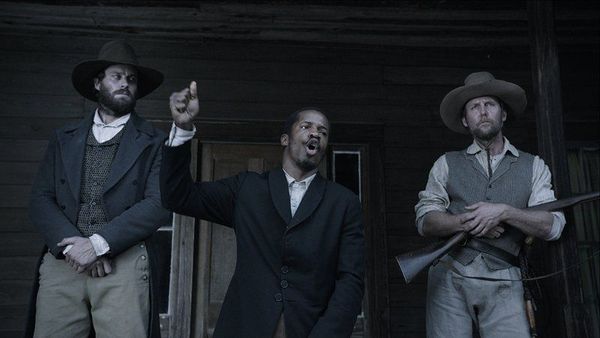Eye For Film >> Movies >> The Birth Of A Nation (2016) Film Review
The Birth Of A Nation
Reviewed by: Jennie Kermode

There are few bolder ways to present a film with an African American hero than by using the title of DW Griffith's famous racist epic. It's an act of resistance that sets the stage for the new film's narrative, but it does have a flip side. As well as being ideologically loathsome, Griffith's film was technically brilliant. Nate Parker's film is not. Structurally and narratively, however, each is very much of its time, which adds weight to the message that the politics of Griffith's film belong in the past.
Where Griffith tried to build a foundational American myth based in the idea of brave white people overcoming brutish black people (with a lot of cheesy melodrama and a sizeable helping of sexism on the side), Parker's film speaks of an America founded on resistance to slaveholder brutality and on the recognition of innate human equality. The comparison of these two Americas could not be more timely, and it is probable that Parker's film will benefit from a present day political climate he could not have wished for.

The film tells the story of Nat Turner, the man behind one of the most successful slave rebellions in American history. Turner's is a legend naturally suited to the cinema and it says something about racism in the industry that - with the exception of a 2002 docudrama and a 2013 TV movie - it has not been told in film before (interestingly, another version is in the works for 2017). Part of the strength of the story, however, lies in its moral complexity, and Parker's reductive approach, more concerned with creating a hero than depicting a man, means it never achieves the impact that it ought to.
A slave who stood out from early childhood due to the fact that he managed to learn to read, Turner was celebrated as a preacher but was used by whites to persuade black people they ought to be submissive - that the Bible said one should obey one's master, and that doing so was the only way they might escape further suffering in the afterlife. Travelling around the plantations, however, he was repeatedly confronted with the brutality of how other slaves were treated - an area in which Parker's film acquits itself well in its subtler moments - until he became convinced that a violent uprising was both necessary and justified.
The real Turner, who recorded his thoughts on the matter, considered himself a terrorist justified by religious imperatives, but these thorny issues are pretty much completely elided from the film, with the slow process of political awakening being condensed and given a more personal twist in classic Hollywood style. Though some reference is made to visions and prophecy, notably in the opening scenes, there is little reference to Turner's belief that God was speaking to him through visions, nor to the deeply superstitious beliefs that led to the timing of his uprising. Also absent is the difficulty and danger of communication among the plotters, though this has considerable cinematic potential. Instead we are presented with a much more conventional, modern hero in lone wolf mode until an army suddenly assembles around him. This may make it easier for a modern audience to relate to him, but it robs the film of depth.
Also problematic here is an unwillingness to address the realities of slavery head on. Yes, it's important to avoid exploitation, but by having almost every traumatic scene take place off camera, Parker risks losing control of the narrative, letting white audiences who have been fed apologism for decades assume they're not really all that bad. Inevitable comparisons with 12 Years A Slave won't help; where Steve McQueen forced viewers to look, Parker seems to flinch. In places this gives the film the atmosphere of a TV movie. It means that when Turner finally takes his revenge it's harder to sympathise with him than it should be.
Despite these issues - and despite a disappointing lack of punch in what should be heroic action scenes - the film has its moments. Parker is a better actor than he is a director and is particularly good at putting across Turner's religiosity, reduced though it is. Aja Naomi King brings a bit of edge to the underwritten role of Cherry, Turner's wife. In amongst the formula shots of sunlit poplar trees, absurdly spacious houses and grimy slave quarters at night are more striking images, such as that of a little white girl running off to play, towing a little black girl by a rope around her neck. But when Nina Simone starts singing Strange Fruit, it's all too apparent that nothing here comes close to that power. The Birth Of A Nation is a missed opportunity. One can only hope that it will achieve enough to clear a path for better films about these aspects of America's history to be made in future.
Reviewed on: 17 Nov 2016


















